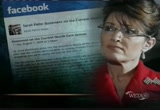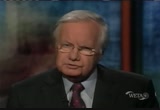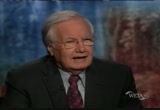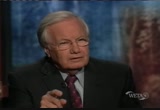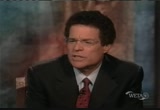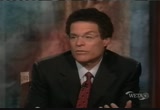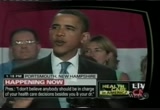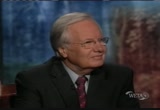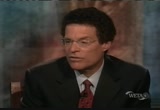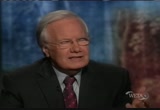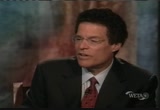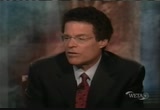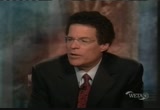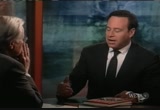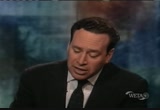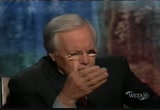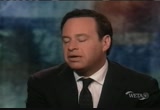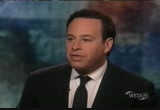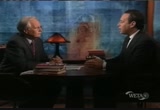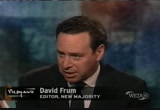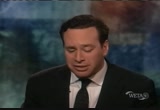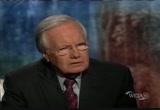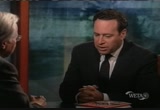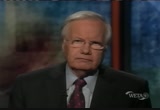tv Bill Moyers Journal PBS August 14, 2009 9:00pm-10:00pm EDT
9:00 pm
captning sponsored by public affairs televisio >> this week on bill mors journal. >> moyers:hat do you do when the healthare debate becomes a shouting match? you bring in two indepdent refees to separate fact from fictio >> we don't have a diberative process he, taking place in public to inform publiopinion. >> mediaoverage follows the controverss, instead of the pele issues that brought us this debe in the first place. >>oyers: and, david frum from the sh white house asks his fellowonservatives what they will do if they actually sceed in killing off health care reform. >> if e republicans win, this is not going to be areat victory for indidual liberty, it's going to be a victoryor the status quo. >> moyers: stay tuned.
9:01 pm
>> om our studios in new york, bill moyers. >> moyers: welcome to e jonal. i'm okay witprotest. sometimes i wish i'd done mo of imyself when i was young. but it's hard reason with someone who'packing a gun. that's why i foundo menacing at photograph of the fellow standing outside presint ama's town hall meeting on health care in n hampshire is week with a 9mm pistol
9:02 pm
strapped to his igh and a sign quoting thom jefferson on wateringhe tree ofiberty with the blood of tyrantand patriots. knowing from his myspacerofile that he admires white supremacists, itade me queasy to see that man anding there, pistol at hiside. of course, he's exersing his second amendme rights under the constitutionnd he has a carry permit. but still. the otesters i admire are ose unarmed men and women wh put emselves in danger for civil rights. and the suffragettesmarching for the right to vote. and the veterans of the bonu army who camped out in washingtonfter the first world war, when the vernment defaulted on its obligions to th. and thoswho spoke out against the vietnam war. ve been haunted for years by the image of the pacifist o doused his clothg in kerosene and burned hself to death beneath robertcnamara's pentagonindow in 1965, soon after i'd had meeting in that very office. some said heas delusional, but
9:03 pm
his wife said he w expressing, "hisoncern over the great loss of life and human ffering caed by the war in vietnam." overhe years, i came to better understa the deeply moral grounding of h anguished martyrdo >> no more omacare. just s no! just sayo! >> moyer so you can see, perhaps, why it's hard eveto describe as protestshat's happeng today-- the raucs disruption of town meetings that de others their rig to free speech. thcries of tyranny, the analies to hitler on the signs and in postings the internet. that not conscience at work; it's the product of cocky, cranky unconscionablanger, fueled by lies. here's newt girich dissembling on health care. yes, the same wt gingrich, once disgraced, noback on the nday talk shows like napoleo returning from elb >> you're askings to trust turning power over to the government when ere clearly
9:04 pm
are people in america o believe in estlishing euthanasia includi selective standards. moyers: remember, this is from thean who told the new york tim in 1994 that he would use opsition to clinton's heal care reform as, "a springbod to win republican control of the hse." that's exactly whahe did... and hopes to do agn. oh, i foot sarah palin, who, like gingric is also vying to speak for the extremright of their rty. she noted on her facook page that"the america i know and love inot one in which my parents or my babyith down syrome will have to stand in frt of obama's ¡death pane. ch a system is downright evil," she said. death panel? we he nothing to fear but fear mongering itself. ev in the hallowed halls of congress, the cuckoolu seems to have reached epemic proportions: >> this program of goverent option that's being tout as being this panacea, the savi
9:05 pm
of allowing people to ha quality health ce at an affordable price, is goi to kill people. >> moyers: thrghout our history, there's a thin li between t-headed, partisanship and deeply ingrained parana. yet whatre we really talking out? nothing less-- or more-- tn trying to do a civiliz thing-- stem the exorbitant sts of a healthare system that routinelvictimizes those without e wherewithal to check into a hospital when they' sick. how to maksense of all this? i put out an s.s. for my two guests. they're st what the doctor orred. you'll recognize kathleen ha jamiesonnstantly. she'been at this table often, making sense of potics and the press. she is director of the annberg public poly center at the univsity of pennsylvania, which runsactcheck.org, a non- partan research organization th tests the accuracy of our political discrse. among her many boo is my favote, "unspun: finding facts in world of disinformation."
9:06 pm
dr altman is president and e.o. of the henry j. kaiser family foundatn, widely respecd for its independent resech and information on american health care. the foundation runs a perb, impartial website th looks at the healthare reform advertising itz and measures claims against the truth welcome to y both. you're jusin time. >> tha you. >> moyers: we're sing this debate te a really ugly turn. let'take a look at how ugly. >> no more obamaca! no me obamacare! no morobamacare! >> tell me what ge it's on. what page is ion? >> it is ithe bill. >> whapage? >> go and t down. >> you want to talk out conspiracies? i'll tell you about conspiracies! >> one day god's goingo stand before you and he's gog to judge you. kill the bill! kill the bil
9:07 pm
ki the bill! >> iant to know if it's coming t of my paycheck? yes or no! >> your empler supports the ll. >> i want an answer tohe question! >> moys: kathleen, what's playing out here? >> people who are gry and frustrated and not necesrily well informed, in part drin by people who are on e other side of the refm effort. anit's driving into news evocative vials that are leading the public, i thin to ergeneralize the extent to which there isrincipal, reasoned disnt from health care refm. >> it's partf our democracy, but i thk it's actually kind of sad becse the left doesn't like this legislation a t. they're not really enthuastic about it. they would prefer a singleayer approach wh more government. anon the conservative side, they're not crazy out it eith. they would like a market approach, pele getting vouches or a tax credit and ju shop in e marketplace. this is wn-the-middle legislatio and yet we s these fears and concerns as if ts were a
9:08 pm
radical proach. it's not a radical approh. it's just a down-the-mdle approach. >> but y're also seeing something else. in your clip you see a wom who says, "is it comg out of my paycheck?" she's raisina legitimate estion. but when peoplare shouting at each other, the answer doe't get through. and when you'rimpugning the inteity of the person who's answering the estions, the member of congress, th person's resnse isn't going to be bieved if it is able to be ticulated and isn't simply shoutedown. and so it's t creating context in whichisinformation on both sides can be correct. and that's the problem. don't have a deliberative process he taking place in puic to inform publiopinion. instead, we're potenally distorting i >> but i think wt also happens is, the concerns of most americans, of average amicans, just get lost inhis process. this who debate began because of the real problems and wores that average peoe are having paying tir health care bills. and at we really have here are the strongoncerns and fears-- and you don't nt to minimize th; it's part of our
9:09 pm
democry-- that some people have about this legislion. but the worries that arage people have that we e in our polls about paying the bills get lost. and in instead we're debatg othethings, fears that people have that really aret there in the legislation. >> moyers: how dwe decide who these people repsent? i mean, e they just a fringe element that are le honey to the cameras of the press? or is there somethinelse going on that's difficult this moment to measur >> i'mot sure that we should be trying to measuret. i worry abt public opinion lls coming into this environment and king questions at may actually distort our understanding of wt the public know less you start by asking the public in a poll wt they know, what the baseline level knowledge , it doesn't matter what the plic thinks, ultimately, about a piecof legislation orot because you can be reflectg uninformed public opinion. t the nature of public opinion, it's expressed in "a toda in at a front-page piece that appred on thursday of this week which says, rotests
9:10 pm
tilt views on healthare bill." now that's reflectg the results a poll that asked out people's response not to the health care bi, but to the protts about the health care bill. but the headne leads you to think it's about the hlth care bi itself. and it suggests at public opinion is now shiftg dramatically ay from the obama health care reform efforts. >> moyers: so thprotests seem to be making some people mor sympathetic to the protests? >> andotentially the press then picks tt up, polls, finds that sympathy, creat a structure that sugges that health care form initiatives are losing support. w polls have driven press coverage which says, "obama the defense. obama struggli to explain. ama trying," when, in fact, the dynamic under at has been created by a news structure at decided to cover this in a certain way, to do polli in a certaiway. and those two ings played into the process make it more diffict for the discussion to actually happen abouthe
9:11 pm
substance of whas going on. >> so it's exactlyight. soe have the protests, the media covera, especially the 24our news cycle, follows the prests and the town meetings. then the polls poll out the media coverage of the otests. and we cate almost an alternative realy about what is occurng out there. when you look at the real pos out where the public actuall is, what y see is there's been a little bit of tick down in public support and people ar getting a little anxious athey foll the media coverage. bustill the majority of the american peoe are for moving forward with this. and have seen more people begin to say, "gee, i'm t so sure that this is goodor me anmy family," but it's still a sml number. it's onl20%, 22% who say, "i'm a little bit wored about th." and a ch bigger number say, "i still think thiss good for me anmy family." and then y've got a group in the middle who's n so sure. and eryone's fighting for that group on both sides. >> and imagine iyou're trying now as just a person who sittinin your home and you do all rts of other things. you have a job, you have
9:12 pm
children, yoknow, you have all rts of concerns. and what you get othis debate is what comes through news the pictures that you're seeg are-- becau the news is focusing on conflict a attack-- are a very any people shouting at representatis. rst, no substantive information. but secondly, whatren't you seeing? well, you aren't seeing somethinthat actually was featured on the frt page of "theew york times" this week. "free heth care draws thousands. thousands of peoplcame to the fom in englewood, california, for free dental care andree medical and vision services. people at protests, people protesting health re reform shoutingt legislators as oppod to people waiting for free healtcare and dental re... >> moyers: who can'tfford it otherwis >> who can't affd it otherwise. now suppe we saw more of these pictures a fewer of those or just a balance of the two. you'd have a completely different sense of wt's at play in the debate piures matter. ocative visuals lead us to
9:13 pm
generalize to what's imptant to theraming of the debate, how we should see this discussion. d also they help shape the answers to tse public opinion polls. more pictures of pple ssenting, more sense that maybe we suld hold back a little in our suort. more pictures people in need of care, people st like us who don't have it, greater sense that maybehere's a social concern here. and then the question mit i, the insured, at some point bin that situation? >> and you really got toeel bad for ju the american people who, from the begiing, have justeen trying to answer one question. will ts help me with my health care bills? th's the question they're trying to answer and so they're turning on th levision and they're seeing debate about wheer this is russia or itsn't russia and whether there are death nels and whether it's a goverent take over ofhe health care syem. and they jt want to know "my premiums are gng up $1,000 premiums areoing up $1,000 evy five years. anis this going to help me with that 'cause i c't pay my rent or my mtgage? m having trouble paying for fo because of my health care bills." that's really the questi they wantnswered.
9:14 pm
>> moyers: some of it dends upon how welthe member of ngress handles the protest. i saw one is week in which senator mccaskill ofissouri did quitwell. take a look. >> we ll not get a single- payer bi, nationalized health care system out of cgress. it's not even on theable. i don't understa this rudeness. what is this? i don't get it. i honestly don't g it. you all think that you are persuading pple when you shout out like that? beg ur pardon? u don't trust me? >> moyer some of those protesters, somef the loudest protesters, were advates of a single-payer natiolized plan that-- wch she said is not going to happen. so what doou think about how she handled that? >> well, first, there is a w to structure these encounterin whicyou increase the likelihood thathe person who is there to speak for th congress, in this se senator mccaskill, actuallis able to controthe microphone. and in parin this structure, in the rooms of some of the member as they talk to audiences is set up for nfrontation because the memb is standing the in the same environment, lookingace to face wh all these individuals.
9:15 pm
and once you get into at range and cameras me in, you can hear the shoutg out at the same moment you hear the meer's voice. and as a rult, the member doesn't control thenvironment. she'controlling the vironment. but more important, she, across the last week, s held a number of foms in which she's d a chance to explain in dep at lger... in longer periods than ts, the substance of the various pieces of legislion and debunk minformation. that's the way democracy shouldork. and that the attacks areoming om both the left and the rig is an importt realization. there's been a tendency news to feature those that are cong from the right without dicating there's substantial dissatisfaction from some onhe left about t fact that this isn't single-payert the time which those on the righthat, yes, it is; it's canadn style socialized medicine. that igoing to produce all sorts ofad outcomes that, in fact, don't occur in canador great britain,n fact. >> it'revealing that in this clipthe single-payer advocates were supset with the senator because it just mas the point that both the folkfurther on the left andn the far right
9:16 pm
are equay dissatisfied with this legislati. i'd ke to make just one other int about this bill, which i that they're all doi town meetings. d these town meetings, of coursebring out folks who are most interested the issue on the right d on the left. and that leaves thpresident ale as the national communicator about health reform. anit might have been helpful if se of these members in the ngress who are putting this legislation together ao played a role as nation explainers of what going on with health form because, again, the president is by himself as t national explainer of this issue. >> but how do you plain that he has lost control of the messag i mean, he'sot the biggest pulpit of all. and yet he'sot determining this narrati right now, right? how did drop the ball? >> he's st the message in news. he didn't lose t message in his town halearlier this week when he spenmuch of the time in the town ha explaining the legislation and guing that the status quo is arier. if we don't change, it's srier than if do change.
9:17 pm
and he did it in detail and did it very fectively. news tn comes in and plays that town hall as obama onhe defense, trying to explain his message. and what happens is the few who watch the town hall gethe whole contt. th was an effective town hall for president obam he made one serious err when he suggested a.a.r. had certified thlegislation, that the legislion would not produce cuts in medicare, en in fact it has not endorsed y legislation. thatlso then is featured in news. but those who watchethe whole town hall i ink reasonably would haveoncluded a strong case was made at keeping the status quo, not puttg change in place, was scarie what was going to happen in e futures scarier for those with insurance th it would be if we de the change. >> ihink, in addition, what happened is, for time, the experts'genda and the policy makers' agenda on pitol hill hijaed the public's agenda. >> moyers: wt do you mean? >> because the fus became about bending e curve and health informaon technology and the policy makers' understandablenterest in
9:18 pm
reducing the feral deficit in thfuture. and now, as you y have noticed, they brought the discussion back the concerns of the people, which broug us is debate in the first place and so the languaghas changed. it's now about hlth insurance rerm and not about health reform. >> moyers: te a look at this ntage. >> and that's why we are gng to pashealth insurance reform in 2009. wh we pass health care reform, insurance companies will no longer be able to ple some arbitrary cap on the amount covera you can receive, in a given a year or a litime. we are clor to achieving health insance reform than we have ever been. every time we comelose to passing health insance reform, the special interests ght back wi everything they've got. >> moyer health insurance reform. not health carreform. wh's the strategy behind that? >> people like their heah care. theyon't want their health care reformed. the probleis one of access and cost. and they misframed this deba
9:19 pm
in 1993, '94 by talkg about health ce reform. early in ts debate... >> moyers: the clions? >> yes. early this debate, talked about health care form brought up all the wrong associatis. if it's health iurance reform, then who's potentially t enemy? the insurance dustry. who'rationing care? it's the insurce industry. who should we be concern about bringing und control? the insurance industry. they're the ones w stand betweeyou and your doctor. obama's comi in to interdict that. he's going to get this uer control. it's a verimportant reframing. >> i think this is rlly critical becausehis wasn't the debate drifted for while and the messe drifted for a while. itasn't defined in terms that average people couldnderstand. so thecouldn't answer... >> moyers: you're cluding me in tha i'm serious about that. >> and may i... >> i tnk you're including all of us in that. >> so people just coul't answer the queion, "what does this mean fome and my family?" and so they dn't know what th had to lose if this didn't happen. t more importantly, that lef the field open for the ctics and e opposition to define it
9:20 pm
the way they wanted tond even to scare people a ttle bit that this might be a governmt takeoverf the health care system. or a bureaucrat mit get between u and your doctor. people couldt say, "no, i want to fht for this because i know what i'm going to ge i'm going to g some help with bills." or "i'm ing to get... the insurance syst is going to change. or i can change jobs and'll still ve health insurance coverage." they didn't know what they wld get. they didt know what they might lose if this didn't ss. anthat now is changing. in a sense, whatappened was the media and thdebate focused on the isss which were in coention on capitol hill, that they were debating on pitol ll, because media coverage follows the controrsies instead of the peoplissues that brought us this debate the first place. >> moyers: let me ow you the ad that the beral group moveon.org irunning, taking on the insunce industry, in the vein of what obama was sing in portsmouth, new mpshire this week take look. >> they arenormous and powerful. they py on our weaknesses, trying to sepate the healthy fr the sick.
9:21 pm
thr strategy is to confuse and exhaustheir victims. and ey kill people each year by denying coveragwhile profiting biions. during srk week, let's take on the real predars: health insurance companies. ll congress, tell them: don' t insurance profits before health care. suppt a real public option. >> is an evocative image, the idea that the heth insurance industry is a sharabout to devour you. but what... ast plays with you beforehand, it's certain one that's memorle. i don't think it's faito suggest that they're kling peop. there is process in place, however, in which the public option is robust in this hlth inrance plan, it does amatically change what they are able to do. and we could come out this reform scenario with aorld in which things are much beer for the insurance instry, but don't necessily accomplish the objectives that presidt obama has if the public option is taken do by arguments that it's government taover or socializededicine or whatever. i think the public oion is an important pie in cost control
9:22 pm
d in insuring long term that the surance industry, which has many positive aspects,ut at the insurance industry is as competive as it ought to be, but also to treat peop fairly. >> you kno one side says it's a governnt takeover of the health care system. and the other side says, "we, thenou'll just be left at the mercy of the sharks in the health insurance iustry." th's messaging. it's standarhealth reform messaging. ether there is or isn't a public option in this legislion, it would fundamentally chan how private heal insurance works in a way that would be bett for people. that's the substance of th legislation. >> moys: how do you explain the disinformaon and the minformation? you had representative john ca this week saying that oba's planreates a new cottage dustry of death counselors. you' got sarah palin, newt gingrich talkingbout euthanasia. what... hodo you account for that? anhow does the press break through and thaverage citizen break through understand that that's a lie? >> that's one of thoselaims
9:23 pm
generated because provision in the bill has meant... a ovision of one of the bills s been seriously distorted. but in this case, news organizations ve actually done a very good job debunkinthe claim. you just simply count up th numberf news organizations that have taken that o gone to the ovision, said, "it's not there; here's what ts is," you'd say news hasone a pretty od job. why is there sll misinformation out tre? beuse you have in these news accounts of the wn halls people still shouting abou death counsels or deatpanels. d as a result, it's still getting througin news despite news's own debunking of it. >> moyers: so it's an efctive strategy? >> any strategy ich takes the white house off message d puts the prident in the position of having to denyhe death panels are in a bill is an efctive strategy for the opposition. takes something which is a tiny, tiny, tiny misleing piece of one piece of potentl legislation and ows it up into being, in fect, the intent of the bill, killg grandmother. >> the's a deeper issue, i think, which is not st bunking the myths and doing the facthecking, which is
9:24 pm
critically imptant. but it is how much and h often yocover the town hall meetings and spend timeebunking the myths and doing the fact checking. because the more you cover i the re the focus becomes the ads and the townall meetings. even if you're fact chking and even if you're providing the fas, you create unease among the ameran people that there something wrong here, that there is a date that there may not actuallye about these facts. and at unease grows. and we s that in our polling. we do a tracking poll ever month on this. and you can just seehat anxiety growing in the arican people. >> moyers: sthe fear mongering is working? >> i believe that thisill turn, much as anything, on the media coverage of this. and it has in e past. and the media has set of important decisions make, not st about getting to the fact aspposed to covering, "he said this and sheaid that," but how much ty cover the town hall meings, how much they cover thads, as opposed to looking at the legislation and als
9:25 pm
vering what's in it, what it means for people. >> moyer well, there's not any legislation yet, as you ve... >> well, whave five bills and we'll... >> moyers: yeah. >> ...maybe get to two a then to one. but wel see. and i predict end-of-life voluntary private counseli, i bet, is t going to be in the final legislation. >> moyers: euthanaa? >> and i bet the word "euthanasia" is t ever going to appear in aiece of legislatn. >>omebody may make a decision that having luntary counseling st isn't worth it. >> moyers: don't know why they included that in the bill. >> it s a republican... >> moyers: yeah, yh, exactly. now 's backing away. >> you know, inow why. the... everyonwho has worked with elderly parentsr foresees a point at which they are gog to have to be maki these kinds of decisions hashought abo end-of-life issues. >>oyers: i had my mother when she was dyg, you know? had to face that. you... >> wl, and we... we've all been in this kind of a situation. and we're gointo be personally affected by is at some point.
9:26 pm
and wouldn't you like have at that poi the... the ability to sathat... that that discussion you'd like to ha with your doctor abouthat the options ok like? do you want to stay on a veilator under these kinds of circumstances? you know, at kind of heroic means do you want in case,ou know, you were in crital life support failure? how muchesuscitation do you want? do you want a do-not-resustate order or not do you wt that encounter with your physician, when the ysician's explaining what th means paid for or no i can see someone sitting a room saying, "why would want to denpeople the opportunity to take vantage of that medical exchange andave it covered?" why uldn't you want people to know about hospice, ich is a a wonderful movement in th country that hasone more... >>they genuinely thought i would be helpful >> and ion't think they heard the possibility that thiwell- intentioned, and i tnk comptely appropriate move, would beranslated into killing grandmother. and i'm interested, by the w, inhich no one's hypothesizing killing grdfather. >> moyers:ell, i think there are too many grandfathers congress in controof the legislatio
9:27 pm
i mean, but the truth the matt is no good deed goes unpunished, right? >>ell, i don't think we anticipated. inhe past, these debates were about heth care's legendary interest groups anraw politics. but, you know, there is a de strain iour country. there was a debate once abt fluoridation, just fluidating thwater supply. and it became debate about this being a communi plot. >> moyers:h, democracy... ...believe these things. this is our country. >> moyer what do you think when you hear protesters standing up at the town hall meetings s, "keep your cotton- picking government hds off my medicare?" what'soing on there? >> i love the fact that the people love thr medicare because it provides the sis, ultitely, for a turn in this argument texplain how similar pa of these proposals to their mecare. it actually is reassing to me, nothat they're misinformed and don't realize th medicare is governmentased, but that the medicare model is, ifact, the model under the public oion esseially. >> younow, facts are useful here. while this lislation does involve a signifant expansion of gernment financing for
9:28 pm
coverage for pple, it's useful to point out that thlion's share of the cerage is private coverage, whicis why many people think therivate insurance industry is pporting this legislationand they are becae they get more paying customers. d while there is a debate abouthe public option in this legislion, one, it isn't clear that a public option wl marialize in the final legislatn because many people are against it. and the coressional budget office has actuallestimated looking at the houseill that if tre is a public option under the rules-- and won't go rough the details of how it wi work-- potentially by 2019, which is a ways off, mbe nine ten million people might enroll in that public option so that could haly be construed as a government takeoverf the health care system. >> mers: yes, drew, but what people on the left say, lirals and people even further left say at what this legislation threats to do is to require tizens to subscribe to insurae under the insurance company. and without a public optn, the
9:29 pm
insurance company s a captive constituent. >> one the reasons forhat is in order to dohe reforms of the health insuran system, how health insurance wor, which everyone benefits fr. it's the one part of this legislion that helps everyone. so you can't be tued away if you get ncer or heart disease or if u're sick. you'd have to have big pool, you spread the risk that wa so tt those of us who are healthy are subsidizing thosof us who are sick becae we, too, may t sick some day. so tt's the reason for the requirement that everyons in. >> moyers:s it a legitimate concern that if i'm requiredy government to have insurce and the onlyeople selling that insurance are insurae companies, then i'm their ptive? >> well, what it reay means th is we have to be... i think this is the next shoe to dp in this debat once we get pa five bills and we can focus on wh are the details ofealth reform, health inrance reform... sorry, legislation is, there' be a set of rul about what are the minim benefits that need to be
9:30 pm
providedo people are adequately protected what's the bas plan that peopleill get? at are the subsidies that people are going to t? and will the subsidi that ople get be adequate so that now they're gointo be required have health insurance corage, they can actually afford that verage? and when we see e details of e legislation, when we get t a house bi and a senate bill ana final bill, i believe everyone wilbe focused on that question because sometng on the order of 30 milln people-- it could be re or less depeing on the details-- will ben these so-called exchanges buying mostly ivate health insurance polici and will be able to look at that. and another maybe 11illion people will getting their coverage through expansis of the medicaid progr. so the'll be a lot of people who are affected bthat. >> but there's one otherssue. it's not simply going toe will individuals able to afford it under a mandate, but will government bable to afford it? will we collecvely, as the taxpayers,e able to afford? and onof the things that is
9:31 pm
legitimate underlyg the protests in ese encounters with members ocongress is a concern about thcost. can e government continue to carry these gigantic deficit will the... >> moyers: a legitate question. >> and those are very importt questions. and it... wh the c.b.o. has ored... >> mers: congressional budget office. >> ...existingegislation, it has suggested that some the projections were overl optimistic. d as a result, that we may n yet be in a situion in which obama, psident obama, can deliver on his prose that this will be deficineutral over ten years. and then it's poible that they get being deficit neutral over ten yea. what about the out yrs? wh about the years beyond ten years? 're in a situation that we wouldn't have been in weret not for many of e decisions of e bush administration. but the deficit now is a sious issue wi real economic consuences in the long term. and when you hear individualin these exchangewith members of congress saying,irst, we had the big bailou then we had the bistimulus. then we hacash for clunkers. how e we going to afford that?
9:32 pm
at are you passing on to my chdren and grandchildren? and what's igoing to cost me as a taxpayer? those individuals are asking gitimate important queions and as are the republica who are concerned about hothis is going to bpaid for long term. that's helping trestrain the process to increasthe kelihood that everybody is gointo be honest when they lo at the c.b.o. numbers, the final piecof legislation, to see wh the effect is on deficit and debt long term. >>nd it needs to be said that there are legitite reasons why nservatives, be they repuicans or blue dog mocrats or any conservative, could be againsthis legislation. it's just not death nels or governnt takeover, but there are legitimate reasons ty could begainst it. the policy makerwho are tting this together are absolutely commied to doing this in a deficit neutral way. moyers: meaning? >> mning that they will pay foit through a combination of sangs measures and new revenues >> it ll not contribute to the ineased deficit? >> over e first ten years. >> but there's bit of a catch he. first, though, thas the
9:33 pm
ggest challenge they face. ofll the challenges they face, the toughest ones financing, financing, financing. it is coming up with that li of savings measures annew revenues. at really is the toughest nu to crack. and that's wt they're working away at. i think that you've got a real problem with co shifting this country. it's not as lae as the ministration has made it out to be. but when peoplcome into hospitals without insurae and they are hped in the process, as they should be,hat cost goes somewhere and it mes off into the people who are sured through some mechanism. i think we oht to be concerned about what that does onomically in the long term, also what it ds to the well being of those who come witht insurance and, as a result, t care later with a rse prognosis. we ought to be concerned aut that bause we're moral human beings. but when obama, presidt obama, makes the big argument which says ourconomic future is dependent onixing this, if he could make that ngle case, he uld justify putting this through ev if he couldn't in
9:34 pm
the process guarantedeficit neutrali across a period beyond ten years. he hasn't persuasively madthe case. buimagine if he could persuade you th we've got another kind of economimeltdown coming because we're not fixi this piece of o own economy. and he makes the case you, we could fostall that. or if it were to happen, i wouldn't be asad if we fixed this. wouldn you find that a peuasive argument? i think there's case to be made, d i think it's a challenge to him to make i >> moyers: what willach of you be loong for as congress comes back io session on this issue? >> i would look for, think, two things one, obviouslyhave they weathered this stormuring the recess does it unravel or does move forward still? i'm certaiit'll move forward. i'm prty confident it will move forward let me put it that way. and then secondl when they put the legislation togeth, have they found a way to y for it? and what is the treoff between lowering t price tag of paying for itwhich they're trying to do, and e benefits people get? and when we look athat, does
9:35 pm
it still mt the expectations of the american people for t he they're looking for with their health care lls? >> i'm not looking for wt congress doe but i'm looking for the signals at are sent to the public by groups the pubc trus. if the final legislation ces forward and the a.a.r. has actually endorsed it, en you have a powerful signalo seniors that there's notng here tt's going to hurt you. if aoncord coalition, which cares a lot about defici, has said thifinal legislation has tten the cost drivers under ntrol and hence long-term costs unr control, that in fact this ll help address the problem of rising cos, and if e a.m.a. and the nursing sociations are also on board then i think you'lhave reassurance that you've t two important groups in the alth care equation saying, "we dot think that our relationship th our patients is ing to be hurt by that or our abilityo do our job." i'm going to look for thosfour signalthat they've got a good piece of legislation. and i ink if you've got those four snals, much of the
9:36 pm
details n fall to the side because you've got a lot o reasrance going out to the public that it's not as scaras the extremes on ther side would gue. >> moyers: drew altman, thleen hall jamien, thank you for ing with me on the journal. >> thank youbill. >> youe welcome. >> iant everybody to be as courteous and as civil to everybody else as possible >>e won't go, we won't go! angry mob! angry mob! >> moyers: i was loong at the website newmajoritcom the other day and was stopd by the question: what iwe win the alth care fight? what happens the thwriter, david frum, went on to warn s fellow conservatives to be careful what they wi for. david frum is with me now. he's the cadian-born journalist whoecame a speechwrit to president george w. bush, the first iider to
9:37 pm
write about that admintration. this is s book: "the right man: the surprise presidcy of george w. bush." now a resident felloat the americ enterprise institute, david frum edits newmajority.co which is "dedicated to the dernization and renewal of the republin party and the consvative movement." his other bookinclude "how we got here: the '7s, the decade that brought you mern life, for better or woe," and his most recent, "comeback: conservatism that can n again." welcome tohe journal. >> thank you, bill >> moyers:hat did you mean nservatives should be carefu what ty wish for? >> well, let me invite youjust for a minute, to imagi yourlf a conservative republican and lking back on the story of the past decade. and as you look back at it, u kn, what was one of the greatest pnts of vulnerability of the republican cord as they went into th2008 election cycle? it was t stagnation of wages that occurred between 2000nd 2008. basically, theypical american worker wasaking no more money
9:38 pm
in the yr 2007, before the crisisthan in the year 2000. why not? it's not that emplers weren't ying more for labor. they'rpaying a lot more for labor, about 25% more. l of that increase in the wa nd was consumed by the cost benefits so republicans went to the country with a very dial econic record in large part cause of the explosion of health carcosts. let me ge you another thing to thinabout from a republican pot of view. we belve in tax cuts. conservatives nt to lower taxes. yet the bush tax cuts e slated to phase o in 2010 and 2011, whever the democrats do. it's just automatic. why was the tax t written that wa it was the rules of ngress to make sure there wasn't an explion of the deficit, require e tax cut to be phased out because ofhe remorseless rise in the cost of progra li medicare and medicaid. if those proams don't stop increasing in costs, thereill nevebe another tax cut. and we are going to faced with government takingn ever- largerhare of the nation's economy. >> moyers: so the republicans n this health care fight, by
9:39 pm
that think you mean if they just simply defeat whaver the democrats propose, rig? republicans... there are ma republicans who fantasizabout a reat of 1994, when the inton plan was defeated and republicans we on to win back both houses of congress, forgetting that 1994 was thend of a verlong period, more than 40 years in thcase of the house, of democratic rule, tt th was a very weak majority anyway this is a yog and strong democrat majority. and they also remember 14. they're going pass something. so the question forepublicans is what doou want that to be? yohave an interest here, too. yowould like to see the rise inealth care costs slow. and u would like to see more room in the federal budgetor tax cu in the future. the are some mistakes in the way that president oba has presented his case that have madeim vulnerable. you kn, he's made it very clear why his alth care reform will be good for t federal budget. he's not made it so clear y it would be good for the typil peon. that's a point ovulnerability. but if theepublicans win, this is not going to a great ctory for individual liberty
9:40 pm
it's going tbe a victory for the status quo. the pele who are angriest in those town halls are peoe who have an exceent deal on medicare, who are determinedo prott it. you can't blame them. people are very attachedo what they he. but unrstand the message the politil system will take if obama isefeated is not let's have a l more free market indivialism. the message the politil system will take is never tamper th medicare ain unless it is to make it more generous. from a conrvative point of viewfrom a republican point of view, is thaa good message? >>oyers: you mentioned the bush tax cuts. you we in the white house at the time those were implemend. anthey are due to lapse next year. isn't that lse a good thing because we need more revenueo pay fothe health care system at even you want to reform? >> i wouldike to see those tax ts continued. especially the tax cuts on capital gains and dividends. those are, ihink, really important to the future grth of the amecan economy. and it is preciselin order to prott, the rising costs of health ce have to be restrained. if health care costs connue to ow as they have been growing
9:41 pm
there wi never be another tax cut ever. and the level of taxatioto the economis bound to rise and rise and rise. the thing that is hilariously grimly ironic about this date, whatever you think of the ama plan-- and i don't-- well, tre isn't an oma plan. >> moyers: theive plans on the ll right now. >> the house plan, wch i don't much like. which is the mt finished plan we have. when the psident talks about , he talks about that plan using arguments at i think out to resonate with conservatives and reblicans. he talks about theederal budget. he tks about the cost to ployers and to small busines anthose are real concerns, even if u reject his solution, which i pe will happen. there are other parts of t congress, like t senate financcommittee, that can produce respses that reply to the valid concerns the presint raising, concerns, by the way, tormented republican presidents before him. >> moyers: so at's the plan yowould like to see the republans put on the table? >> well, let's sta by focusing on what do you tnk is the problem? you can't solve a probm unless
9:42 pm
you agree on what u're trying to achieve. threpublicans are not the rty of equality. they're the rty of liberty and they're the party of efficiey. >> moyers: and liberty leadso inequality. >> liberty leads to ineqlity just as attemp to reduce equality lead to adoption of liberty. and it is that tradeoff thats why you ve two parties so that thcountry can come to its balae. especially in this heah care debate, we are tking a lot about efficiencies. why is themerican health system so crazy? why americans spend so much more than anybody else f outcomeshat aren't a lot beer? well, wealk about the health market. we don't have a alth market. we have 50 state markets and although there are many, many iurers, in many states there are only oner two who are acve. so what we need to do, fst of al is create a national market. i would like to see the responsibity for regulating health care moved from the states entiry and put in the hands of the fedal government. we don't regulate bankinat statlevel anymore because it doesn't make sense. that should be true with insurance as well. the federal governmenthould set rules.
9:43 pm
here a the requirements for what a healtplan should look ke. >> moyers: nowou've just lost me of your conservative alli... >> but the state... >> moyers: .because you're caing for more regulation. >> no. the states regulate itight now. and theyegulate it in incredibly detaileways. they sayn some states that infertility must be cored if anythi is and other states not. in some cases, ia woman has a mastecmy, the plan must cover renstructive surgery. in other states, not. in se cases, there's community rang. everybody must be arged the same price. in other states, there are different systems. so froan insurer's point of view, they have to wte a complete different set of offeringfor maryland from oregon, from new yk, from new mexico. and the resu is that you have thessegmented little markets. it's a case r free trade to say let's begin by oning up a nation market. >> moyers: if yoeliminate regulaon at the level of 50 states, aren't you givg the insunce industry more clout at the national level? >> it's a doside risk that you uld have much more regulatio at the national level. but just thi about it.
9:44 pm
if we had 50 differentileage standards in ts country, if we had 50 different sets of rul to dcribe what could and couldn't go into toothste, we would just collapse thnational market. e reason almost every produc is cheaper and better and mo convenie in the united states than it is iother places is becae of the size of the national mket. nourprise that when the national markeis cut up for one pruct, that is the product that is the most troubsome. a seco immediate thing, if you're self-employed-- t way more a more people are-- and you want tgo buy a plan, u'll have to play with after- tax dolls. employers buy th before-tax dollars. if you're a small business, u gea much worse deal than big businesses. we need to regulate, lev this field. one ofhe ideas that originates with t heritage foundation that was adopt by republican governor mitt romney arehese health insurancexchanges that allow dividuals and small business to buy on more equa terms. again, that can be nationalid and made... that's, the way, in the obama pla health exchae. we need to bin to sever the link between empyment and insurance. it is just... it's a holver
9:45 pm
irrationality that you g your inrance through the place where you work, that discoages peop from leaving. people who get ill, en they're at a job are theindentured because they can't. so long as they can wk at the old company, they are vered under the olplan. if they ve, they can't get a w one. and there. and that is an artifact of the tax co. and we neeto correct the elements for theax code that do that. breaking the lk between employment and covere. we have a terrible problem rht now withhe cost of medicaid are divided between e federal government and t states. this is a formula, alws, for irresponsibility becausehe ople who are not only... are states spendin50 cent dollars or in some casesess, but worse, when it ces time to cut budgets, a state, escially a ate that gets a lot of money from t federal government, says"if we take dollar out of mecaid, we buy a dollar's worth of political pain. and yet we only get 40 cen of budgetary benets." so that makes no sense. and so medicaid ratchets endlesy upwards with no one really in controof it.
9:46 pm
we need, i thinkto have to locate medicaid either with e states or with the federal governnt, not continue to divide them. >>oyers: what about a public option that would pride a government competion to the healthnsurers? it would not end priva insunce, but it would provide competion, which, of course, consertives believe in because they believeompetition reduces prices. >> this is going to be a linin the sand and o of those... >> moyers: deabreaker? >> no, on which a t of potics is about political muscle. at do you bring to the party party a s this view. party has that view. and they put their shoders against each oer in rugby style, see whoan push the other over the line. for reblicans, it's absolutely unacceable. for a lot of docrats, it's secrly unacceptable. >> moys: what do you mean? >> well, i think there a a lot of things thatemocrats from nservative states pretend to be in far of to keep in good order with the nationaparty, ile counting on the republicans toake it imssible to happen. when they have demratic jorities, they then quietly defect because they don't believe in it ther.
9:47 pm
>> moyers: so you're saying public option isot politically feasib? >> no, i saying it's not acceable to conservatives. >> moyers: what about you? you've broken wi conservatism in thirespect. >> i am not an unohodox conservative. i think i'm a calm conseative. right noi think a lot of... their blood is up. they want to win this fight. >> moyers: is that w we're seeinghese protests, these loud, raucous protts? >> wl, let's distinguish betwn the people who are in those halls, who i think are many..who, as i say, are people w have a good government pn in medicare and are anxious because theynow thatresident obama wants to take a lot of money ouof medicare. that how he's going to finance his plan >> moyers: he says not. no, he acknowledges he's going to take ney out. he just sayst's going to make no difference. beuse they're going to find so many efficiencies. so there areeople who are a litt skeptical about it. and th're kind of worried. those are thvoices. now, that's different fromhat you're hearing othe radio. that's different from what
9:48 pm
you're going to be sing in television adversing. those people have more ideological motives. but what i aconcerned about is the desire to defeat president obama, theepublicans e going to fossilize a statu quo that is mo unacceptable to em. >> moyers: you mn an unworkable hlth care system. >>ight. because from the poi... think about this, if youe a democrat and you're confronted withver- escalating health care costsnd escially ever-escalating health care sts in the public sector, oh, well. you raise taxes toay for it. it's nothe worst thing in the world. and if health care grows a if government gws with it, you know, you're not as upset by government as repuicans are. you want to hold the line o the growth of gornment over the next t decades, this syem has to be reformed. >> moys: that's what kathleen hall jamieson says. she saidhat in order to fix e long-term deficits, which are a concern to conservates, we neeto fix health care. is that what you're sayi? >> yeah, if u see president obama saying, volunteer to go into t beehive and put my hand inside the beehi and fix it," good luck, buddy. better youhan us. like, why aren republicans saying"here's some things you can do that we'll like." here are our r lines.
9:49 pm
if you do the publicption, no. suaxes, no. gher taxes on capital gains, no. but if you have an ideas to how to slow thgrowth in medica, if you want to do things like this healt exchanges, making itasier to afford to ke it easier to buy across state lin, well, good luck to you. thatounds pretty good. and if you're prepared ttake e political heat, again, you know, good luck to you. >> moyers: i'm remindethat you grew up canada. >> i did. moyers: couldn't the conservative, a calm conservative make case for that kd of national insurance plan in this count? >> look, where tho plans have growup, as in britain, for example, y've seen conservatives ma their peace with them, athe british conservatives have de. and once somethings integrated into the status o of your country, it gets conservate. there are, i think, a lot of reasons not toegard it as a preferable system. it stifles the posbility of invation and diversity. it means that ideas thatet
9:50 pm
into the minds opeople in washingtonre very difficult to get out. anit creates a... it also creates this tremends problem where evy malfunction in the system becomes the faultf the politician >> moyers: you describe yoself as a calconservative. but you have certainlyroused ose to your right in the republican party. you knowtalk show hosts like mark levin have come afterou saying youe kneecapping your own. what about that? >> loo a lot of the coervative movement in this country is conducting itse in a way that is tremendously structive. both of the basic constutional compact of the requirements good faith and of their own od sense. i mean, when you were going the air and callg the presidenof the united states a nazi as rush limbaugh has repeated done. when mark levin-- yomentioned hi- he said the president of the united stes is literally at w with the american people. and then people begi unsurprisingly, showing upt rallies withuns. wellobviously, if the
9:51 pm
president were. i mean, folks, if i bieved the president of the united statewere a nazi, re planning a fascist takeov, it would be contemptibly cowardly ofe not too everything in my power, including contemplatg violen, to resist such a thin every decent person ould do that. that's why you don say it when it's not true. and i mean, one of the ws that the constitution system works is with me understanding that thpeople on the other side ha slightly different priorities, but they share yr constitutional vues. they have invested in thsame stem. the problems they've got a hard problems. and evenf you don't like their answers, you have to have so restraint inhe way you talk about them, as you would hop they would have out you. and i think it'sust trageous. it is dangerous. it's dangerous forhe whole constitutional system. i'm absoluly prepared to fight with them. and by theay, it's dangerous to conservatives because t effectf the talk of people like levin and rh limbaugh is kill our cause with voters who are under 65. you ma that man the face and you say let us contrast m to
9:52 pm
barack obama, who is maybeoo exnsive, but who seems calm and judiciou that's an ly comparison. >> moyers: for this appeance ale, your website, newmajority.com, is gog to be sieged by some of those folk right? >> we have been beeged, but this is a ght worth doing. and i have to say i'm inking of changing ouslogan. i'm adapting something fm the old panasonic fos, our new tto's going to be "just ightly ahead of our time." i know the conseatives of this country are not with me these issues today. but i know equal well they will be with me on these iues in theuture. they are just going to lea it, unfortunely, a harder way. >> moys: the book is "comebac conservatism that can win again." david frum, thanks forng with mon the journal. >> thank y. >> rublicans have a better solution that n't put the governme in charge of people's health care, tt will make sure we bring dn the cost of health care for all americans. anthat ensures affordable access for all aricans, and is pro life becau it will not put seniors in a position ofeing puto death by their
9:53 pm
government >> moyers:hat's it for the journa your lette and e-mails are lling us what you think of o coinuing coverage of the health care debate. we'll be staying with thistory foas long as it takes, and it's usefufor us to read your comments, bo pro and con, out our work. we read erything that you post. over theext two weeks we're presenting t important documentaries on health re. first up is a fi from the oducer roger weisberg that tells thstory of what happens average americans who fall seriously ill without insunce. 's called "critical condition." >> aot of people areying, and they are dying because ty don't ha health care. >> medical care definitely a righ nobody should be turneaway. >> the bigssue is your money or your fe.
9:54 pm
>> you spend most of youlife working, but oe you don't have healthnsurance, every thing you wo for your whole life will jusgo. >>it shouldn't matter if you got a $20,000 a year j. your life is jusas important as somebody else's that mas a lot of money. >> mers: that's next week on the jonal. in the meantim you can learn much more about thhealth care debate by loing onto our website at pbs.org. ju click on "bill moyers journal." there you'll be ableo fact checall sides of the health care reforad blitz. you'll also get side-by-side comparison othe different healthare reform bills currently circling capol hill. i'm bill m see you nextime. captioning sponsor by public aairs television
1,629 Views
IN COLLECTIONS
WETA (PBS) Television Archive
Television Archive  Television Archive News Search Service
Television Archive News Search Service 
Uploaded by TV Archive on

 Live Music Archive
Live Music Archive Librivox Free Audio
Librivox Free Audio Metropolitan Museum
Metropolitan Museum Cleveland Museum of Art
Cleveland Museum of Art Internet Arcade
Internet Arcade Console Living Room
Console Living Room Books to Borrow
Books to Borrow Open Library
Open Library TV News
TV News Understanding 9/11
Understanding 9/11



